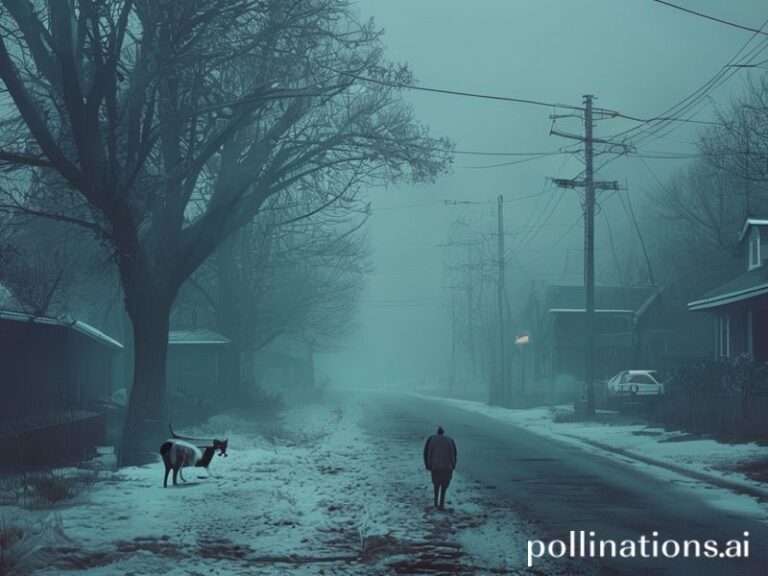Global Horsetrading: How Minecraft’s ‘Mounts of Mayhem’ Became the World’s Newest Currency, Crisis, and Confessional
From the relative safety of a café in Warsaw that still remembers when pixels were rationed, I bring you the geopolitical tremor nobody asked for: Minecraft’s “Mounts of Mayhem” update has galloped onto 180 million screens, dragging behind it more baggage than a UN peacekeeping convoy. Mojang insists the patch is merely about rideable ravagers, leashed llamas, and saddled striders, but in a world where teenagers in Manila trade emeralds for TikTok clout and Berlin anarchists build pixelated barricades against digital gentrification, nothing stays “just a game” for long.
In Seoul, the update launched at 3 a.m. local time; by dawn, the city’s PC-bang owners reported a 17 % drop in students cramming for the suneung exam, opting instead to breed armored hoglins like Cold-War missile silos. Meanwhile, Nairobi’s burgeoning esports cafés—once hopeful engines of youth employment—have become ad-hoc livestock markets where diamond-hilted carrot sticks serve as hard currency. The Kenyan shilling, already limping, now competes with enchanted golden apples nobody can actually eat. You can almost hear the IMF gnashing its teeth louder than any raid captain.
Across the Atlantic, Washington’s think-tankers—those industrious souls who can weaponize a baguette if the grant money is right—have labeled the update a “soft-power Trojan horse.” Their logic: if American kids learn resource management atop a snorting ravager, perhaps Chinese kids will do the same atop a strider in the Nether’s lava lakes, and the balance of imaginary power shall be maintained. Somewhere in Brussels, an EU subcommittee on “Digital Fauna Ethics” has convened its sixth emergency Zoom, debating whether pixelated animal husbandry violates the same regulations that keep French geese force-feed-free. The French delegate abstained, citing “cultural exceptions” and a suspicious fondness for foie gras.
Then there’s the climate angle, because of course there is. Activists in Stockholm glued themselves to Mojang’s lobby doors claiming that encouraging virtual mount travel reduces real-world carbon hoofprints. They were gently removed by security who reminded them the building runs on hydroelectric power and the protesters’ synthetic glue is 43 % petroleum. Greta, presumably, face-palmed from a safe distance.
But the darkest irony lurks in the global south. In Caracas, where inflation makes Zimbabwe look fiscally prudent, parents who once sold Runescape gold to buy diapers are now farming “Mounts of Mayhem” saddles for hard currency. A stack of black-dyed leather horse armor currently equals three days’ minimum wage—an economic indicator more reliable than anything the central bank has issued since 2012. Local economists have coined the term “piglinomics,” which sounds adorable until you realize it’s describing child labor in a lava-filled hell-dimension.
Even the Vatican has weighed in. A Jesuit journal published a dense 4,000-word treatise on the theological implications of riding demonic beasts, concluding—after much Latin—that if the mount consents and you feed it regularly, the act is “morally neutral, though spiritually tacky.” The Pope, busy apologizing for things that happened in 1520, has yet to issue a formal blessing.
So what have we learned while the planet teeters between climate collapse and the fifteenth crypto winter? Simply this: humanity, presented with limitless creative potential, will immediately monetize, militarize, and moralize a blocky pig on a leash. The update’s true achievement isn’t new code; it’s exposing our age-old talent for projection. Give us a sandbox and we’ll build a stock exchange, a battlefield, and a confession booth—then charge admission to all three.
As night falls over this café and the barista starts stacking chairs like defensive cobblestone, I log off knowing tomorrow’s headlines will belong to whichever dictator discovered you can dye leather armor the exact shade of his national flag. Somewhere a ravager snorts in agreement. And somewhere else, a child who’s never seen a real horse learns that saddles can be stolen, traded, or—if you’re small and quick—earned. In the end, perhaps that’s the update’s most honest lesson: the mounts aren’t the mayhem; we are.







